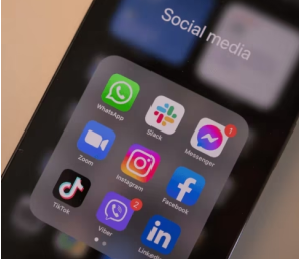What Makes Life Seem Mundane on Social Media?

Social media has fundamentally changed how we perceive and share our lives, often making them appear repetitive or mundane. While it provides a platform for connecting with others and showcasing unique experiences, the social media app banality of life can quickly set in, as feeds become filled with similar images, captions, and curated moments. This uniformity can make even exciting experiences feel routine. By understanding how content repetition, comparison culture, and the search for online validation shape our perception of daily life, we can begin to recognize why social media sometimes makes life appear mundane.
The Influence of Repetitive and Curated Content
One of the most notable effects of social media is its tendency to amplify and replicate content that adheres to popular trends. This often leads to a “sameness” in the posts we encounter. For example, a viral trend or popular aesthetic can flood feeds with nearly identical photos, whether it’s travel snapshots, perfectly arranged food plates, or heavily edited selfies. This repetition is fueled by algorithms that prioritize what’s popular over what’s unique, creating a cycle where users are encouraged to imitate what’s successful for more engagement. As a result, the diversity of real life often gets lost, replaced by content that adheres to specific patterns and themes. The curated nature of social media also plays a significant role in making life appear mundane. By presenting only the highlights, social media can feel like a collection of moments designed to impress, rather than a genuine portrayal of everyday life. While such content might be visually appealing, it often lacks the authenticity and spontaneity of reality.
Comparison Culture: Unrealistic Standards and Expectations

Highlight Reels vs. Real Life
Social media encourages users to share their best moments, creating what many call “highlight reels.” These highlight reels capture peak moments, from vacations to career achievements, and present them as an ideal version of life. The issue arises when viewers compare these curated highlights to their own day-to-day lives, which naturally include ups and downs. This imbalance can make ordinary, everyday experiences seem insignificant by comparison, leading to feelings of dissatisfaction. Furthermore, when scrolling through a feed of highlight reels, it can feel as though everyone else is living a life of excitement and accomplishment, intensifying the feeling that one’s own life is mundane or unremarkable.
Pressure to Create “Perfect” Moments
The culture of comparison on social media extends beyond viewing others’ posts; it also pressures users to create equally impressive content. This pressure can lead people to stage or embellish their experiences, striving for images and moments that will gain approval from others. For many, this pursuit of perfection online creates stress, as they feel obligated to match the standards set by others. Unfortunately, this emphasis on perfect moments can dilute the enjoyment of real-life experiences, as people focus more on capturing an idealized version for their followers than on living in the moment. As a result, even remarkable experiences can feel hollow or staged.
The Algorithm Effect: Seeing the Same Content Repeatedly
Algorithms on social media platforms are designed to prioritize content that is engaging, often promoting posts that receive higher levels of likes, shares, or comments. While this helps users see what’s popular, it can also create a narrow view of the world. When algorithms constantly push similar types of content, users end up seeing the same posts or themes repeatedly, even across different accounts. This effect contributes to a sense of monotony, as feeds are filled with predictable posts that adhere to popular trends. Moreover, the algorithm’s focus on popular content discourages diversity in what users post. Knowing that a certain type of content is more likely to gain visibility, people may feel inclined to follow these trends to attract more engagement. Over time, this creates an online ecosystem where unique and diverse experiences are less visible, replaced by repetitive posts that conform to an algorithmic standard of “success.”
Lack of Authenticity: How Filtered Lives Affect Perception
The Role of Filters and Editing Tools
Filters and editing tools have become commonplace on social media, allowing users to enhance and alter their images. While these tools can be fun and artistic, they also contribute to the lack of authenticity on social media. Filters often present an idealized version of reality, with enhanced colors, smoother skin, or modified environments, creating an unrealistic portrayal of life. Over time, this emphasis on filters can make authentic, unedited moments feel less appealing. When users encounter only edited images, it reinforces a skewed perception of daily life, which can feel dull or uninspiring by comparison.
Overemphasis on Likes and Validation
Social media platforms are built around the concept of validation, with likes, shares, and comments serving as metrics of approval. For many users, these metrics influence what they post and how they view their own experiences. When validation becomes the goal, posts are often tailored to please the audience rather than to reflect genuine emotions or experiences. This focus on external validation can make even exciting or personal moments feel routine, as people begin to prioritize how an experience will be perceived over the experience itself. This constant pursuit of approval reinforces the sense that one’s own life is mundane when compared to the carefully curated lives of others.
Conclusion
While social media can sometimes make life appear repetitive and uninspired, it also offers opportunities to celebrate the ordinary. By stepping back from the pursuit of perfection, users can approach social media as a place to share authentic moments rather than to meet idealized standards. Embracing the genuine aspects of life—its imperfections and all—can bring a sense of satisfaction and fulfillment that curated images cannot provide. Redefining our relationship with social media to focus on sharing rather than impressing can restore meaning to our digital lives, allowing us to find joy in the real and the everyday beyond the “banality of life” that social media sometimes promotes.



